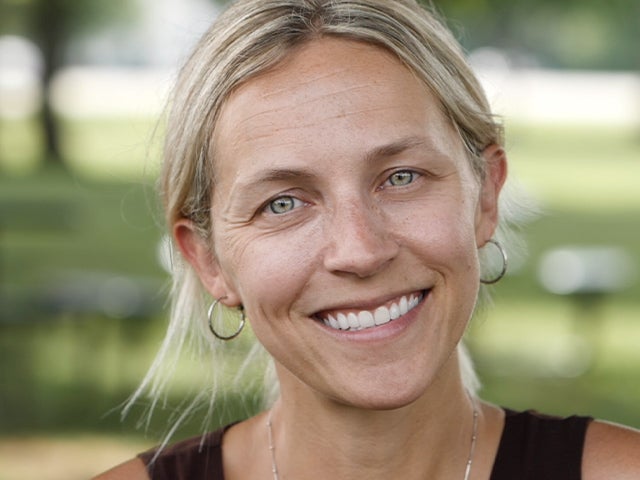I Am Not My Addiction
“The first time I drank I just felt this sense of ease and comfort. I just remember being able to like, talk easily. I felt like I was funny,” Abby says. “I felt comfortable in my skin for the first time. My life just instantly revolved around alcohol from that point.”
From a young age, Abby Pawley had deep insecurities and never felt accepted. “As a child, I never felt good enough. Sometimes I would be compared to other kids in my class, so I never quite felt like I measured up. I didn't get great grades. I was always trying to get my parents' approval.”
Although she excelled at sports in school, she says she always yearned to feel loved. “I felt like I had to be thin in order for other people to love me, because I didn't think I was lovable, and I would see magazines and pictures of women who were thin and in my head I thought that that's what people wanted,” she says. “That's what I thought I needed to be for boys to like me, and for other people to accept me and love me.”
When she was just 10, Abby received some shocking news.
“People had just always made comments, that I didn't look like my parents, so one day I just asked my mom if I was adopted and she said ‘Yes, you were.’ And so it kind of shocked me. I really wasn't – know what kind of answer I was expecting,” Abby says. “Through that time, I just always wondering, like why did they give up for adoption? Like, where did I come from? It really left me with a lot of questions in not knowing who I was.”
Abby’s emotional pain led to a decades-long battle with anorexia and alcoholism. “I was blackout drinker from the very start-- and my life just instantly began to revolve around alcohol. I was about 15 years old, and I had been at a party, drinking, blacked out, and got in a car with a guy, and when I came to, I didn’t know what had happened. I was rushed to the hospital where they did a rape test. I just remember going into school that Monday and wanting to disappear. And that was when the bulimia started.”
As she grew older, Abby’s alcohol and drug use got worse. So did her anorexia. At one point, her parents intervened and sent her to rehab. “I went to the treatment center for my eating disorder and when I got there I had to fill out a questionnaire and information which had asked me about drinking. So it asked me questions like ‘Do you drink to get drunk?’ And I was like, ‘Well, of course, you know, who doesn't drink to get drunk?’ So they told me I needed to start going to AA meetings.”
Her stint in rehab helped but she soon began drinking again. it took a near-fatal car crash to wake her up.
“My life was becoming more and more unmanageable. I remember praying and asking God, even though I didn't know who God was or if he even cared about me, or if I even believed in him, but asking God for help--that was when I had a car accident and hit a telephone pole,” she says. “And I feel like that was just God stopping the madness in my life and kind of taking me out of my life, putting me in a hospital bed for five days where I could detox and not hurt anybody.”
Shortly after, she visited southeast church in Louisville. during the service, she heard a song by Hillsong Worship that changed her life. “I saw the banner that said, ‘Connecting people to Jesus and one another.' So I knew that was what I wanted. That’s what I was looking for,” she remembers. “And when I walked into the sanctuary for service they played the song, I Am Who You Say I Am, so I knew right then that I was right where I was supposed to be. Just everything in the sermon and everything just touched my heart. And I just felt like, like I had arrived. I remember that that same feeling when I drank alcohol for the first time, that ease and comfort. And, but this time it was that Holy Spirit.”
Abby says she accepted Christ and was water baptized at Southeast. “I got involved in a women's study, a Bible study. I had told the woman, you know, ‘I really want to learn more about Jesus. I want to learn more about the Bible.’ I had always heard about Jesus but I didn’t know Jesus. And I wanted to get to know Jesus. Only God can fill that God-sized hole, and I feel like that's what filled me up, finally.”
She also re-entered a treatment program for alcohol and her eating disorders. “Going to the bulimia was my way of trying to take back control. it was very, very much a control thing. I've just gotten connected you know, met other women, other believers and learning more about Jesus and finding my identity in Christ,” Abby says. “And that's really helped me recover, you know, from those demons and those voices that always told me I wasn't good enough and seeking approval of other people I've learned that the only approval I need is of God, and he already loves me no matter what.”
Today, Abby is pursuing her bachelor’s degree in education and hopes to go into missions. “So right now, I feel like I'm in this period of waiting and just waiting to see what God has next for me. And one of the prayers I always tell God is that ‘I'm open, willing and ready for whatever you have for me."
Abby says she no longer cares what the world says about who she is. She knows what God says.
“Now I've realized that I am a child of God and just like that song—I Am Who He Says I am. I am a child of God, and really learning what that means,” Abby says. “It's not going to say on my tombstone, ‘She was thin.’ It's just going to say – I want it to say that ‘She was a believer of Jesus Christ.’ That’s what I want to be remembered for.”





